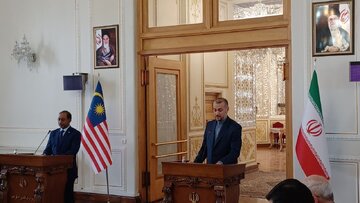Amirabdollahian made the remarks at a joint press conference with his visiting Malaysian counterpart, Zambry Abdul Kadir, following a meeting in Tehran on Monday.
“I would like to deliver a message on behalf of the Islamic Republic of Iran to the governments and law enforcement agencies of Sweden and Denmark: the Islamic world will not tolerate continued disrespect to the Holy Quran,” he stated.
Expressing deep concern, Iran’s top diplomat cautioned that the misguided stance taken by Sweden and Denmark might contribute to the spread of "extremism, violence, and terrorism in Europe".
Amirabdollahian revealed that during a recent gathering of foreign ministers from Islamic nations, the consensus was to consider imposing sanctions on the products originating from these two Nordic countries.
Over the past months, the holy Muslim book has been subject to acts of desecration by extremist elements in Sweden and Denmark, whose governments have sanctioned and justified such insults as “freedom of expression".
Speaking at the press briefing, Amirabdollahian underlined the importance of bolstering economic ties and said an agreement was reached to promptly convene the Joint Economic Commission between Iran and Malaysia in Tehran.
“The joint economic commission between the two countries has not been held since 2017,” he added.
Amirabdollahian pointed out that Malaysia is a substantial market for halal products and Iran is a significant producer of such goods, and called for efforts to increase cooperation in the realm of halal trade.
Additionally, he said an agreement was reached to speed up extraditing criminals from both sides, a process that will be facilitated at the consular level and with the help of Iranian and Malaysian judiciaries.
“In the first step, it was agreed that female prisoners will be exchanged in the near future,” he added.
Amirabdollahian further noted that Iranian President Ebrahim Raisi has extended an invitation to Malaysian Prime Minister Anwar Ibrahim to visit Iran, reciprocated by a similar invitation from Malaysia.
Abdul Kadir, in turn, described his visit to Tehran as a positive step for Malaysia to strengthen its ties with Iran.
The Malaysian foreign minister said he and his Iranian counterpart explored avenues for the advancement of existing bilateral relations and potential cooperation in various fields.


Your Comment